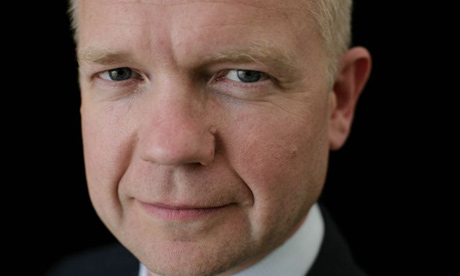By Ian Black
The Guardian
November 16, 2009

Channel 4's film alleges that William Hague faced threats of a withdrawal of funding from CFI after he described a retaliatory attack by Israel on Lebanon in 2006 as 'disproportionate'. Photograph: Martin Godwin
Pro-Israeli organisations in Britain look set to see their influence increase if the Conservatives win the next election, a film scrutinising the activities of a powerful but little-known lobby warns today.
At least half of the shadow cabinet are members of the Conservative Friends of Israel (CFI), according to a Dispatches programme being screened on Channel 4. The programme-makers describe the CFI as "beyond doubt the most well- connected and probably the best funded of all Westminster lobbying groups".
Inside Britain's Israel Lobby claims that donations to the Conservative party "from all CFI members and their businesses add up to well over £10m over the last eight years". CFI has disputed the figure and called the film "deeply flawed".
The programme also describes how David Cameron allegedly accepted a £15,000 donation from Poju Zabludowicz, a Finnish billionaire who chairs Bicom (the Britain Israel Communications and Research Centre). Zabludowizc, the film reveals, has business interests in an illegal West Bank settlement. He also gave £50,000 to Conservative Central Office. Zabludowicz says his contributions "are a matter of public record".
William Hague allegedly accepted personal donations from CFI board members totalling tens of thousands of pounds after being appointed shadow foreign secretary. More than £30,000 from CFI supporters went to the campaign funds of members of Cameron's team who were first elected in 2005, the film claims, using publicly available information.
The programme-makers say that while this is legal, it is not well-known.
The CFI director, Stuart Polak, told the Guardian the figure of more than £10m is not supported by any facts. "It is fictitious, misleading and damaging to the reputation of CFI and its supporters," he said.
"CFI as an organisation has donated only £30,000 since 2005. Each of these donations has been made transparently and publicly registered. In addition to this £30,000, it is undoubtedly the case that some of our supporters have also chosen, separately, to donate to the party as individuals."
Two years ago a controversial study by American academics Stephen Walt and John Mearsheimer explored the influence of the Israel lobby over US foreign policy. But Britain's pro-Israel organisations have been subjected to far less scrutiny.
"The pro-Israel lobby … is the most powerful political lobby," Michael Mates, a Conservative MP and privy councillor, told the film-makers. "There's nothing to touch them."
Full article








